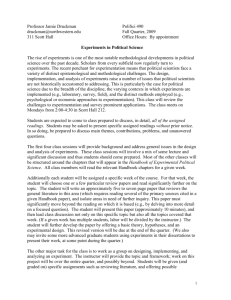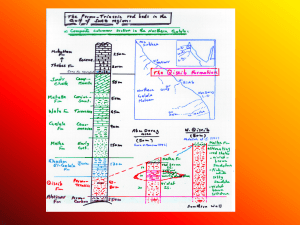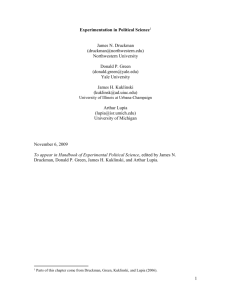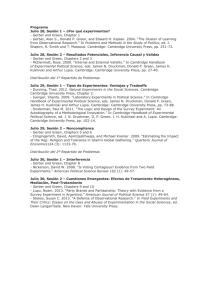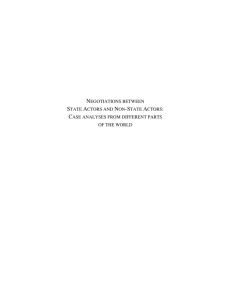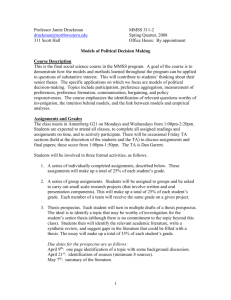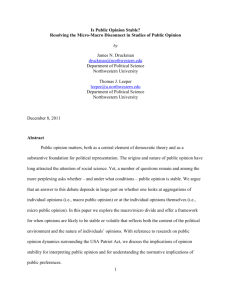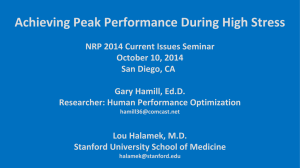Does Political Information Matter?
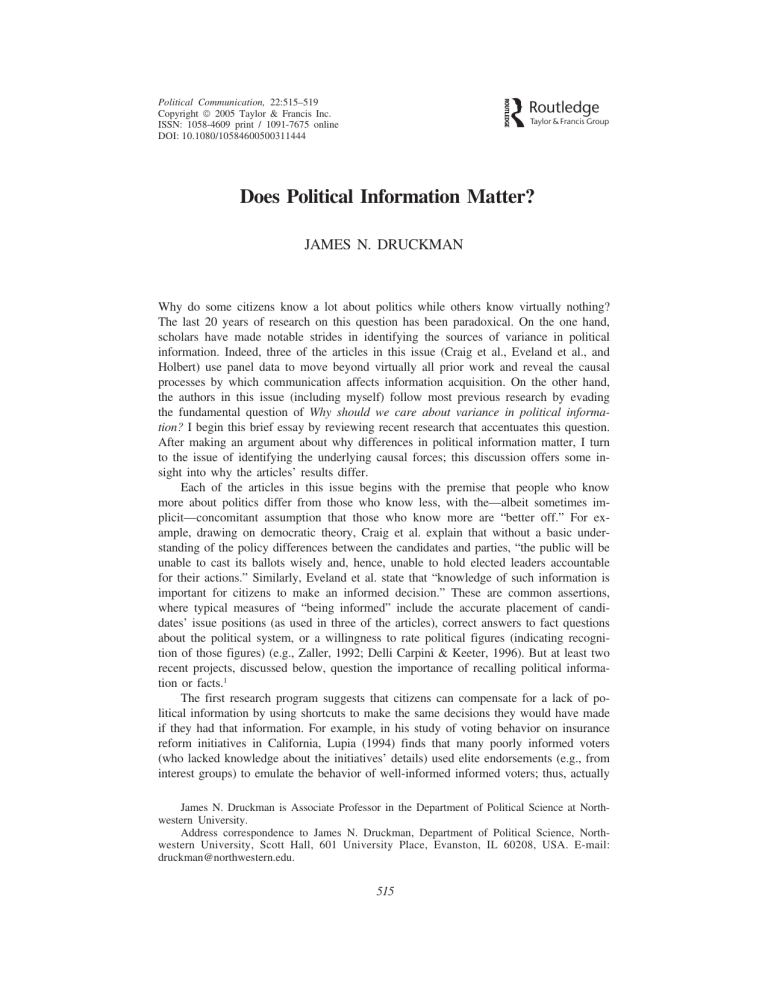
Political Communication, 22:515–519
Copyright
2005 Taylor & Francis Inc.
ISSN: 1058-4609 print / 1091-7675 online
DOI: 10.1080/10584600500311444
Does Political Information Matter?
JAMES N. DRUCKMAN
Why do some citizens know a lot about politics while others know virtually nothing?
The last 20 years of research on this question has been paradoxical. On the one hand, scholars have made notable strides in identifying the sources of variance in political information. Indeed, three of the articles in this issue (Craig et al., Eveland et al., and
Holbert) use panel data to move beyond virtually all prior work and reveal the causal processes by which communication affects information acquisition. On the other hand, the authors in this issue (including myself) follow most previous research by evading the fundamental question of Why should we care about variance in political information? I begin this brief essay by reviewing recent research that accentuates this question.
After making an argument about why differences in political information matter, I turn to the issue of identifying the underlying causal forces; this discussion offers some insight into why the articles’ results differ.
Each of the articles in this issue begins with the premise that people who know more about politics differ from those who know less, with the—albeit sometimes implicit—concomitant assumption that those who know more are “better off.” For example, drawing on democratic theory, Craig et al. explain that without a basic understanding of the policy differences between the candidates and parties, “the public will be unable to cast its ballots wisely and, hence, unable to hold elected leaders accountable for their actions.” Similarly, Eveland et al. state that “knowledge of such information is important for citizens to make an informed decision.” These are common assertions, where typical measures of “being informed” include the accurate placement of candidates’ issue positions (as used in three of the articles), correct answers to fact questions about the political system, or a willingness to rate political figures (indicating recognition of those figures) (e.g., Zaller, 1992; Delli Carpini & Keeter, 1996). But at least two recent projects, discussed below, question the importance of recalling political information or facts.
1
The first research program suggests that citizens can compensate for a lack of political information by using shortcuts to make the same decisions they would have made if they had that information. For example, in his study of voting behavior on insurance reform initiatives in California, Lupia (1994) finds that many poorly informed voters
(who lacked knowledge about the initiatives’ details) used elite endorsements (e.g., from interest groups) to emulate the behavior of well-informed informed voters; thus, actually
James N. Druckman is Associate Professor in the Department of Political Science at Northwestern University.
Address correspondence to James N. Druckman, Department of Political Science, Northwestern University, Scott Hall, 601 University Place, Evanston, IL 60208, USA. E-mail: druckman@northwestern.edu.
515
516 James N. Druckman having more information, beyond that of basic endorsements, made no difference in behavior. As Lupia and McCubbins (1998, pp. 4–5) summarize, “limited information need not prevent people from making reasoned choices . . . people can use substitutes
[e.g., expert advice, ideology, party cues, campaign expenditures] for encyclopedic information” (e.g., Berelson et al., 1954; Downs, 1957; McKelvey & Ordeshook, 1986;
Sniderman et al., 1991; Popkin, 1994). Lupia and McCubbins (1998, pp. 20, 27) further argue that increased information is not only unnecessary for “reasoned” or “better” decisions but may even decrease the quality of decisions (i.e., “the benefit of obtaining information may be zero or negative”; see also Thorngate, 1988).
A second relevant research program focuses on how citizens process information.
Conventional memory-based models of processing assume that citizens canvass their minds for information and then form an attitude or make a decision based on the information they find. In contrast, on-line models of reasoning suggest that when an individual encounters new information such as a candidate’s issue positions, he or she immediately updates his or her standing overall evaluation (e.g., of the candidate). After updating, the individual may forget the information that affected the evaluation (e.g., forget the issue positions). When asked to express their evaluation, people simply retrieve the overall evaluation without searching for the information on which it was based. Lodge et al.
(1995, p. 401) explain that the result may be “that people can often tell you how much they like or dislike a book, movie, candidate, or policy [because they maintain a running evaluation] but not be able to recount the specific whys and wherefores for their overall evaluation.” If this model is accurate, then information recall measures such as candidate issue positions may not reflect the information on which citizens base their opinions. At best the measures are uninformative, and at worse they are misleading (e.g.,
Rahn et al., 1994; Lodge et al., 1995; Druckman & Lupia, 2000). In sum, an individual’s knowledge and/or recall of political facts (e.g., candidate issue positions) may reflect neither the quality of his or her decisions (i.e., more information need not equal “better decisions”) nor the actual information on which those decisions were based.
Not everyone accepts these arguments, and debates continue on the efficiency of shortcuts (e.g., Bartels, 1996; Kinder, 1998, p. 176; Somin, 1998; Kuklinski & Quirk,
2000; Kuklinski et al., 2001) and the prevalence of on-line processing (e.g., Iyengar,
1990; Zaller, 1992, pp. 50, 279). It is beyond the scope of this essay to assess the relative merits of the sides of these debates. For present purposes, the critical point is that the very existence of these contrasting positions highlights the inadequacy of simply assuming that recall of more information is universally better.
It may be “better,” it may
“not matter,” or it may, as Lupia and McCubbins show, even lead to “worse” decisions.
What this means is that studying differences in information requires a rationale beyond simply assuming that information is a normatively desirable end unto itself (in which case it would be important to identify factors that cause information differences).
It is incumbent on scholars to define an independent standard by which to assess quality
(i.e., “better,” “reasoned,” or “competent”) decisions. For example, one could argue that making decisions consistent with certain underlying values is normatively desirable (Chong,
2005), that being invulnerable to automatic “manipulation” is desirable (Druckman, 2001), or any of an array of other possible criteria (see also Druckman & Nelson, 2003, p.
742). The standards adopted need to be justified on normative grounds (i.e., what leads to “good” government, quality democracy, etc.), and the role of information then needs to be motivated as empirically connected to the normative criteria (e.g., enhancing the likelihood of meeting the standards)—for instance, showing that more informed individuals are more consistent with their values. In short, theorists need to lay out clear
Does Political Information Matter?
517 criteria that define competent or good decisions and then document the role of information in affecting these independent criteria.
Of course, there is clear evidence that the amount of information one possesses shapes attitudes and behaviors, including such things as participation, voting behavior, tolerance, and information processing strategies (e.g., Sniderman et al., 1991; Bartels,
1996; Delli Carpini & Keeter, 1996; Lau & Redlawsk, 2001).
Thus, regardless of one’s normative standards, understanding the sources of information differences is important for those who hope to understand political behavior more generally.
An issue with most of the research on political information acquisition, including the articles in this issue, is that it treats information itself as the ultimate dependent variable (although Holbert also looks at the impact on different forms of media usage and Eveland et al. allow for reciprocal relationships). There is little discussion of why the specific measures of knowledge or recall (or the other dependent measures) directly matter in terms of either normative desirability or behavioral consequences. As a result, different scholars employ various measures of information recall without considering the possibility (or the likelihood) that some kinds of information may be more desirable or consequential than others (see Gilens, 2001). For example, it could be that knowledge of candidate issue positions does not matter when it comes to one’s ability to connect values to decisions or to the likelihood of increased tolerance, but perhaps knowing certain facts about the political system (e.g., the constitution) enhances the likelihood of a value-decision connection or tolerance. It is essential that future work motivate why the specific type of information (e.g., general or domain specific; see Gilens, 2001) and the particular measures (e.g., which candidate issue positions, political figures, etc.) under study are consequential. Do the measures increase the likelihood of a normatively desirable outcome, independent of just possessing the information for its own sake? Do they help explain variance in subsequent forms of political behavior? The specific information measures employed need to be seen as a precursor to a subsequent meaningful behavior or an outcome of normative interest, and this means care must be taken in selecting specific types of information and measures.
Once information measures are identified as important—normatively, behaviorally, or both—it is of interest to study sources of that knowledge. The articles in this issue provide insight into the role of communication in affecting various types of information. As several of the authors point out, a large literature contains a variety of inconsistent findings, making it unclear whether all media, only specific types of media, or no media affect learning. The studies in this issue highlight one reason for the conflicting findings in past research: the methodological challenges of studying the causal effects of media. With non-experimental data—which are most common in this area—establishing a causal relationship requires the inclusion of controls of alternative sources of information and individual-level variables that promote knowledge, as well as evidence on the timing sequence of learning (all of the articles touch on these issues; see also Barabas, Jerit, & Bolsen, n.d).
Another reason for inconsistent findings is that for the media or political discussion to transfer a particular piece of information, it must actually include it in its content.
While it often is reasonable to assume that several media outlets taken together carry that information—as is done in three of the studies in this issue—knowing specifically which outlets included the information is preferable. And this typically entails content analyses of media outlets and media specific measures of exposure (see Barabas & Jerit,
2005). Fortunately, recent technological and methodological advances make content analyses more feasible in terms of time and resource demands (Iyengar & Simon, 2000; Althaus et al., 2001).
518 James N. Druckman
Scholars should thus isolate the most interesting normative or behavioral type of information and then seek to uncover exactly which media outlets (e.g., which particular television programs, newspapers, or Internet sites) provide that information. This would enable researchers to take the next logical step in research on communication and learning: exploring not only which media sources facilitate specific kinds of learning but also what aspects of those media do so . For example, holding content constant, what frames, tone, presentations, media (in a more nuanced way than “newspapers versus television”), visuals, and other features enhance learning (see the Craig et al. article in this issue; see also, e.g., Graber, 2001; Druckman, 2003)? Do effects differ across campaign levels and contexts, and if so, how (see the Craig et al. article)? How do exposure to various different media and/or exposure interpersonal discussions affect one another (see the
Eveland et al. and Holbert articles)? These questions are of increasing relevance in a new media age where the Internet requires alternative modes of learning (e.g., Tewksbury
& Althaus, 2000; Lang et al., 2002), and increased competition has altered how media outlets present information (e.g., Bovitz et al., 2002; Baum, 2003). Moreover, developing insight into how individuals process specific types of information and how this depends on media type, presentation, and context will likely provide an answer as to why results from various studies (such as the ones in this issue) differ. Armed with an understanding of learning processes, scholars can then promote optimal methods that help citizens learn the specific types of information that advance the quality of our democracy.
Note
1. Another relevant research program concerns the aggregation of preferences (see Bartels,
1996, for a brief discussion).
References
Althaus, S., Edy, J., & Phalen, P. (2001). Using substitutes for full-text news stories in content analysis. American Journal of Political Science , 45 , 707–723.
Barabas, J., Jerit, J., & Bolsen, T. (2005a). Citizens, knowledge, and the information environment. Forthcoming, American Journal of Political Science.
Barabas, J., & Jerit, J. (2005). Media driven variations in political knowledge. Paper presented at the annual meeting of the Midwest Political Science Association, Chicago, IL.
Bartels, L. M. (1996). Uninformed votes. American Journal of Political Science , 40 , 194–230.
Baum, M. A. (2003). Soft news goes to war . Princeton, NJ: Princeton University Press.
Berelson, B. R., Lazarsfeld, P. F., & McPhee, W. N. (1954). Voting . Chicago: University of
Chicago Press.
Bovitz, G. L., Druckman, J. N., & Lupia, A. (2002). When can a news organization lead public opinion? Public Choice , 113 , 127–155.
Chong, D. (2005). The value of information and endorsements. Unpublished manuscript, Northwestern University.
Delli Carpini, M. X., & Keeter, S. (1996). What Americans know about politics and why it matters . New Haven, CT: Yale University Press.
Downs, A. (1957). An economic theory of democracy . New York: HarperCollins.
Druckman, J. N. (2001). The implications of framing effects for citizen competence. Political
Behavior , 23 , 225–256.
Druckman, J. N. (2003). The power of television images: The first Kennedy-Nixon debate revisited. Journal of Politics , 65 , 559–571.
Druckman, J. N., & Lupia, A. (2000). Preference formation. Annual Review of Political Science ,
3 , 1–24.
Does Political Information Matter?
519
Druckman, J. N., & Nelson, K. R. (2003). Framing and deliberation. American Journal of Political Science , 47 , 728–744.
Gilens, M. (2001). Political ignorance and collective policy preferences. American Political Science
Review , 95 , 379–396.
Graber, D. A. (2001). Processing politics: Learning from television in the Internet age.
Chicago:
University of Chicago Press.
Iyengar, S. (1990). The accessibility bias in politics. International Journal of Public Opinion
Research , 2 , 1–15.
Iyengar, S., & Simon, A. F. (2000). New perspectives and evidence on political communication and campaign effects. Annual Review of Psychology , 51 , 149–169.
Kinder, D. R. (1998). Communication and opinion. Annual Review of Political Science , 1 , 167–
197.
Kuklinski, J. H., & Quirk, P. J. (2000). Reconsidering the rational public. In A. Lupia, M. D.
McCubbins, & S. L. Popkin (Eds.), Elements of reason . New York: Cambridge University
Press.
Kuklinski, J. H., Quirk, P. J., Jerit, J., & Rich, R. F. (2001). The political environment and citizen competence. American Journal of Political Science , 45 , 410–424.
Lang, A., Borse, J., Wise, K., & Prabu D. (2002). Captured by the World Wide Web. Communication Research , 29 , 215–245.
Lau, R. R., & Redlawsk, D. P. (2001). Advantages and disadvantages of cognitive heuristics in political decision making. American Journal of Political Science , 45 , 951–971.
Lodge, M., Steenbergen, M. R., & Brau, S. (1995). The responsive voter. American Political
Science Review , 89 , 309–326.
Lupia, A. (1994). Shortcuts versus encyclopedias. American Political Science Review , 88 , 63–76.
Lupia, A., & McCubbins, M. D. (1998). The democratic dilemma. New York: Cambridge University Press.
McKelvey, R. D., & Ordeshook, P. C. (1986). Information, electoral equilibria, and the democratic ideal. Journal of Politics , 48 , 909–937.
Popkin, S. L. (1994). The reasoning voter (2nd ed.). Chicago: University of Chicago Press.
Rahn, W. M., Krosnick, J. A., & Breuning, M. (1994). Rationalization and derivation processes in survey studies of political candidate evaluation. American Journal of Political Science ,
38 , 582–600.
Sniderman, P. M., Brody, R. A., & Tetlock, P. E. (1991). Reasoning and choice . Cambridge,
England: Cambridge University Press.
Somin, I. (1998). Voter ignorance and the democratic ideal. Critical Review , 12 , 413–458.
Tewksbury, D., & Althaus, S. L. (2000). Differences in knowledge acquisition among readers of the paper and online versions of a national newspaper. Journalism & Mass Communication
Quarterly , 77 , 457–479.
Thorngate, W. (1988). On paying attention. In W. J. Baker, L. P. Mos, H. V. Rappard, & H. J.
Stam (Eds.), Recent trends in theoretical psychology . New York: Springer-Verlag.
Zaller, J. (1992). The nature and origins of mass opinion . New York: Cambridge University
Press.
